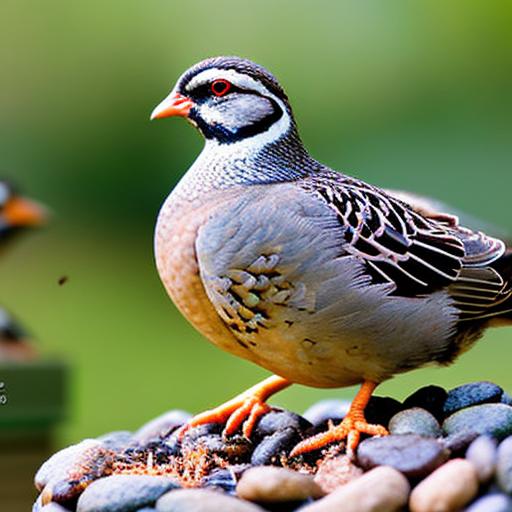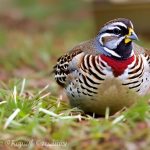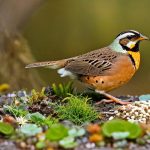When considering keeping quail in an urban setting, it is crucial to first understand the city regulations and zoning laws that may apply to this endeavor. Many cities have specific regulations regarding the keeping of poultry, including quail, within city limits. These regulations may dictate the number of quail allowed, the type of housing required, and the distance the housing must be from neighboring properties. It is important to thoroughly research and understand these regulations before embarking on keeping quail in an urban environment to avoid any potential legal issues.
Additionally, zoning laws may also come into play when keeping quail in an urban setting. Zoning laws dictate how land and buildings can be used within specific areas of a city. Some areas may be zoned for agricultural use, while others may be strictly residential or commercial. It is important to ensure that keeping quail is allowed within the specific zoning area in which you reside. If not, it may be necessary to seek a variance or special permit to keep quail legally. Understanding and adhering to city regulations and zoning laws is essential for successfully keeping quail in an urban environment.
When it comes to keeping quail in an urban environment, it is important to understand the city regulations and zoning laws that may apply. These regulations can dictate the number of quail allowed, the type of housing required, and the distance the housing must be from neighboring properties. It is crucial to thoroughly research and understand these regulations before embarking on keeping quail in an urban environment to avoid any potential legal issues. Zoning laws may also come into play when keeping quail in an urban setting, as they dictate how land and buildings can be used within specific areas of a city. Understanding and adhering to city regulations and zoning laws is essential for successfully keeping quail in an urban environment.
Key Takeaways
- City regulations and zoning laws for keeping quail vary, so it’s important to research and understand the specific rules in your area before getting started.
- When choosing housing for urban quail, consider factors such as space, predator protection, and ventilation to create a safe and comfortable environment for the birds.
- Feeding and caring for quail in a city setting involves providing a balanced diet, clean water, and regular health checks to ensure their well-being.
- Managing noise and odor from quail in an urban environment can be achieved through proper coop maintenance, odor control measures, and respectful communication with neighbors.
- Health and safety considerations for urban quail include disease prevention, parasite control, and emergency preparedness to keep the birds healthy and secure in the city.
- Integrating quail into a sustainable urban lifestyle can involve practices such as composting quail waste, using their eggs as a local food source, and incorporating them into urban agriculture initiatives.
- Connecting with the urban quail community and resources can provide valuable support, knowledge sharing, and networking opportunities for urban quail enthusiasts.
Choosing the right housing and environment for urban quail
When it comes to choosing the right housing and environment for urban quail, there are several factors to consider. First and foremost, it is important to provide adequate space for the quail to move around and exhibit natural behaviors. This can be achieved through the use of a spacious coop or aviary that allows for ample room for the quail to roam, scratch, and dust bathe. Additionally, the housing should provide protection from predators and the elements, as well as adequate ventilation to ensure good air quality.
In addition to the physical housing, it is important to consider the overall environment in which the quail will be kept. This includes factors such as temperature, humidity, and lighting. Quail thrive in moderate temperatures and require access to natural light to maintain their health and well-being. It is important to consider how these environmental factors will be managed within an urban setting to ensure the comfort and welfare of the quail.
When choosing the right housing and environment for urban quail, it is important to provide adequate space for the quail to move around and exhibit natural behaviors. This can be achieved through the use of a spacious coop or aviary that allows for ample room for the quail to roam, scratch, and dust bathe. Additionally, the housing should provide protection from predators and the elements, as well as adequate ventilation to ensure good air quality. In addition to the physical housing, it is important to consider the overall environment in which the quail will be kept. This includes factors such as temperature, humidity, and lighting. Quail thrive in moderate temperatures and require access to natural light to maintain their health and well-being.
Feeding and caring for quail in a city setting
Feeding and caring for quail in a city setting requires careful consideration of their dietary needs and overall well-being. Quail are omnivorous birds that require a balanced diet consisting of high-quality commercial feed, fresh fruits and vegetables, and access to grit for digestion. It is important to provide a well-rounded diet that meets their nutritional requirements to ensure their health and productivity.
In addition to their dietary needs, quail also require regular care and maintenance to thrive in a city setting. This includes providing clean water at all times, regular cleaning of their living quarters, and monitoring their overall health and behavior. It is important to establish a routine for feeding, cleaning, and monitoring the quail to ensure they are well cared for in an urban environment.
Feeding and caring for quail in a city setting requires careful consideration of their dietary needs and overall well-being. Quail are omnivorous birds that require a balanced diet consisting of high-quality commercial feed, fresh fruits and vegetables, and access to grit for digestion. It is important to provide a well-rounded diet that meets their nutritional requirements to ensure their health and productivity. In addition to their dietary needs, quail also require regular care and maintenance to thrive in a city setting. This includes providing clean water at all times, regular cleaning of their living quarters, and monitoring their overall health and behavior.
Managing noise and odor from quail in an urban environment
Managing noise and odor from quail in an urban environment is a common concern for many city dwellers considering keeping quail. While quail are generally quieter than other poultry such as chickens, they can still produce some noise, particularly during mating or when startled. To manage noise from quail in an urban setting, it is important to provide them with a calm and secure environment, as well as consider the placement of their housing to minimize disturbance to neighbors.
In addition to noise, odor can also be a concern when keeping quail in an urban environment. Proper management of their living quarters, including regular cleaning and maintenance, can help minimize odor. Additionally, providing adequate ventilation and ensuring proper waste management can also help reduce odor from quail in an urban setting.
Managing noise and odor from quail in an urban environment is a common concern for many city dwellers considering keeping quail. While quail are generally quieter than other poultry such as chickens, they can still produce some noise, particularly during mating or when startled. To manage noise from quail in an urban setting, it is important to provide them with a calm and secure environment, as well as consider the placement of their housing to minimize disturbance to neighbors. In addition to noise, odor can also be a concern when keeping quail in an urban environment. Proper management of their living quarters, including regular cleaning and maintenance, can help minimize odor.
Health and safety considerations for urban quail
Ensuring the health and safety of urban quail is paramount for their well-being and productivity. Regular monitoring for signs of illness or injury is essential for early intervention and treatment. Additionally, providing a clean living environment, access to fresh water, and a balanced diet are crucial for maintaining their overall health.
In terms of safety, it is important to protect urban quail from potential predators such as cats, dogs, or rodents. This can be achieved through secure housing with predator-proofing measures such as sturdy wire mesh and locks. Additionally, providing a safe outdoor space for the quail to roam under supervision can help minimize risks to their safety.
Ensuring the health and safety of urban quail is paramount for their well-being and productivity. Regular monitoring for signs of illness or injury is essential for early intervention and treatment. Additionally, providing a clean living environment, access to fresh water, and a balanced diet are crucial for maintaining their overall health. In terms of safety, it is important to protect urban quail from potential predators such as cats, dogs, or rodents. This can be achieved through secure housing with predator-proofing measures such as sturdy wire mesh and locks.
Integrating quail into a sustainable urban lifestyle

Integrating quail into a sustainable urban lifestyle can offer numerous benefits, including a fresh source of eggs, natural pest control, and fertilizer production. By keeping quail in an urban setting, individuals can reduce their reliance on store-bought eggs while also contributing to sustainable food production within their community.
In addition to food production benefits, integrating quail into an urban lifestyle can also provide educational opportunities for children and adults alike. Observing the natural behaviors of quail and learning about their care can foster a greater appreciation for nature and sustainable living practices.
Integrating quail into a sustainable urban lifestyle can offer numerous benefits, including a fresh source of eggs, natural pest control, and fertilizer production. By keeping quail in an urban setting, individuals can reduce their reliance on store-bought eggs while also contributing to sustainable food production within their community. In addition to food production benefits, integrating quail into an urban lifestyle can also provide educational opportunities for children and adults alike.
Connecting with the urban quail community and resources
Connecting with the urban quail community and available resources can provide valuable support and knowledge for those interested in keeping quail in an urban setting. Local community groups or online forums dedicated to urban poultry keeping can offer advice on best practices, troubleshooting common issues, and connecting with other like-minded individuals.
In addition to community groups, there are also numerous resources available on urban poultry keeping that can provide valuable information on topics such as housing design, feeding recommendations, and health management. By connecting with the urban quail community and accessing available resources, individuals can gain valuable insights and support for successfully keeping quail in an urban environment.
Connecting with the urban quail community and available resources can provide valuable support and knowledge for those interested in keeping quail in an urban setting. Local community groups or online forums dedicated to urban poultry keeping can offer advice on best practices, troubleshooting common issues, and connecting with other like-minded individuals. In addition to community groups, there are also numerous resources available on urban poultry keeping that can provide valuable information on topics such as housing design, feeding recommendations, and health management . These resources can include books, websites, and workshops that cater specifically to urban quail keeping. By tapping into these resources and communities, urban quail keepers can gain the knowledge and support they need to successfully raise and care for their quail in an urban environment.
If you’re interested in keeping quail in the city, you may also want to learn about the mating season for turkeys. Understanding the breeding behaviors of different poultry can provide valuable insights into their care and management. Check out this informative article on mating season for turkeys to expand your knowledge of urban poultry keeping.
FAQs
What are the benefits of keeping quail in the city?
Quail are small and quiet, making them suitable for urban environments. They also provide fresh eggs and can help control pests in the garden.
What are the housing requirements for quail in the city?
Quail require a secure and predator-proof coop or cage with adequate ventilation. They also need access to a dust bath and a nesting area.
What do quail eat and how can they be fed in the city?
Quail eat a diet of commercial quail feed, supplemented with fresh greens and insects. They can be fed in the city using specially designed feeders and waterers.
Are there any legal restrictions on keeping quail in the city?
It is important to check local regulations and zoning laws before keeping quail in the city, as some areas may have restrictions on keeping poultry.
What are the health considerations for keeping quail in the city?
Quail require regular access to clean water, protection from extreme temperatures, and proper sanitation to prevent disease. It is also important to monitor for signs of illness and seek veterinary care when necessary.
How can quail be integrated into a city garden or backyard?
Quail can be integrated into a city garden or backyard by providing them with a secure outdoor run or allowing them to free-range under supervision. They can also help control pests and provide fertilizer for the garden.
Meet Walter, the feathered-friend fanatic of Florida! Nestled in the sunshine state, Walter struts through life with his feathered companions, clucking his way to happiness. With a coop that’s fancier than a five-star hotel, he’s the Don Juan of the chicken world. When he’s not teaching his hens to do the cha-cha, you’ll find him in a heated debate with his prized rooster, Sir Clucks-a-Lot. Walter’s poultry passion is no yolk; he’s the sunny-side-up guy you never knew you needed in your flock of friends!







